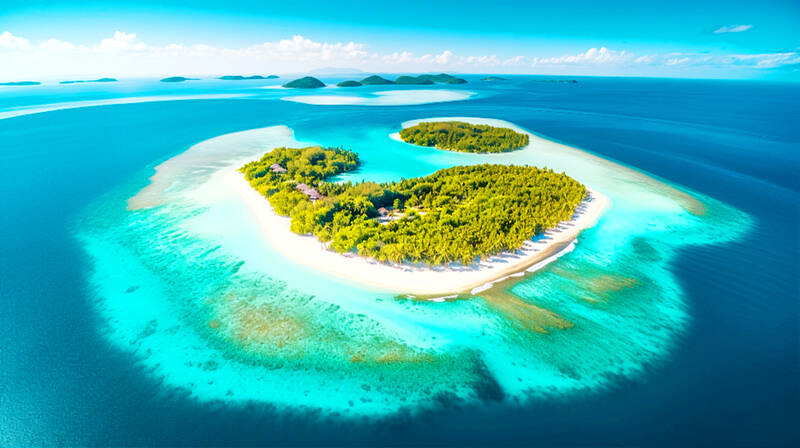Tuvalu is a small country consisting of nine islands nestled in the Pacific Ocean halfway between Australia and Hawaii. During high tide, 40 percent of the capital district is underwater, and that percentage is increasing. In 1989, the UN highlighted a number of island nations, including Tuvalu, that would most likely be flooded at some point in the 21st century.
This disturbing prophecy has been looming over Tuvalu ever since. Tuvalu’s Minister of Foreign Affairs, Simon Kofe, stated in 2021 that drastic action must be taken against climate change to avoid losing Tuvalu to rising ocean levels. The following year, he made another speech announcing that Tuvalu would be recreated digitally and uploaded to the Metaverse. Kofe stated: “It appears we have no choice but to become the world’s first digital nation.”
The project not only aims to preserve the landscape and culture of Tuvalu, but also serves to conserve its rights and boundaries as a nation, even if the country becomes fully submerged. As innovative and creative as this initiative is, it also raises questions of sovereignty, ownership, and ethics. No other question is as pressing as that of who rules a digital state. Can the parliament of Tuvalu sustain its sovereignty, or will the owners of the servers on which the nation is dependent demand power?

Photo courtesy of Freepik / 照片:Freepik提供
What rights will the Metaverse, an American corporation, have over the heritage and legacy of Tuvalu? If Tuvalu wants to truly be in charge of its virtual state, it would need to own its own servers. Where would it house these? There is also the issue of powering the servers, as data centers are known for their excessive energy consumption. This would go against Tuvalu’s attempts to reduce carbon emissions.
Despite the many challenges Tuvalu now confronts, the nation is remaining hopeful for the future, be it physical or digital.
吐瓦魯是一個由九座島嶼組成的小國,坐落於澳洲與夏威夷間的太平洋海域。漲潮時,吐瓦魯的首都區有40%的領土會被水淹沒,而且這個比率還在持續增加。西元1989年,聯合國特別指出包含吐瓦魯在內的一些島國,這些國家很可能在西元21世紀的某個時間點被水淹沒。
從那時起,這個令人憂慮的預言就一直籠罩著吐瓦魯。吐瓦魯外交部長西蒙柯飛於西元2021年表示,必須採取有力的行動應對氣候變遷以避免吐瓦魯因海平面上升而消失。隔年,他發表另一則演說,宣布吐瓦魯將以數位化的方式被重建並上傳到元宇宙。柯飛表示:「看來我們別無選擇,只能成為世界上第一個數位化國家。」
就算吐瓦魯徹底沒入海中,這項計畫不僅力圖保存該國的景觀和文化,而且還有助於維護其作為一個國家的權力和邊界。儘管這項倡議很創新且有創意,它還是有主權、所有權以及道德的問題。沒有其他問題會比誰來統治一個數位國家的問題更急迫。吐瓦魯國會能否維持其主權,亦或該國所依賴的伺服器所有者將能要求國力?
「元宇宙」是一間美國企業,它將對吐瓦魯的文化資產與歷史遺產擁有什麼樣的權利?如果吐瓦魯想要真正掌控其虛擬國家,就需要擁有自己的伺服器。該國要把這些伺服器安置在何處?另外還有為伺服器供電的問題,因為數據中心是出了名的需要消耗過多的能源。這將違背吐瓦魯在減少碳排放上的努力。
儘管吐瓦魯現在面臨著許多挑戰,但無論該國是實際存在還是虛擬的,它對未來仍然充滿希望。
MORE INFORMATION
nestle v. 坐落於;位於
prophecy n. 預言
submerge v. 淹沒;下潛
KEY VOCABULARY
1. percentage n. 百分比;比例
The percentage of students who passed the exam was higher than expected.
通過這次考試的學生比例高於預期。
2. loom v. 籠罩;逐漸逼近
Dark clouds loomed on the horizon, signaling an approaching storm.
烏雲籠罩著地平線,暗示著暴風雨即將來臨。
3. drastic adj. 嚴厲的;激烈的
The company had to take drastic measures to cut costs. 這間公司必須採取嚴厲的措施來降低成本。
4. boundary n. 邊界;界線
The river marks the boundary between the two countries. 這條河川標示出兩國之間的邊界。
5. sovereignty n. 主權;統治權
The country declared its sovereignty and independence from colonial rule.
此國家宣示它的主權,並從殖民統治中獨立。
6. pressing adj. 迫切的;緊急的
The manager had to attend to a pressing matter and could not join the meeting.
那位經理必須處理一件緊急的問題,無法參與這場會議。
7. parliament n. 議會;國會
The bill was passed by the parliament after a heated debate. 在經過激烈的辯論後,議會通過了這項法案。
8. dependent adj. 依賴的;取決於……的
The child is still dependent on his parents for financial support. 這個孩子仍依賴著父母的經濟支助。
9. excessive adj. 過度的
The government has implemented measures to curb excessive use of natural resources.
政府已實施措施以限制過度使用自然資源。
學習音檔: https://magazine.english4u.net/Magdata/menu/qg3ey
《空中美語》雜誌APP免費下載: https://www.english4u.net/apps/index.aspx
免費收聽當月《空中美語》雜誌課文朗讀及解析 !
文章由AMC空中美語授權使用: https://www.english4u.net

In an effort to fight phone scams, British mobile phone company O2 has introduced Daisy, an AI designed to engage phone con artists in time-wasting conversations. Daisy is portrayed as a kindly British granny, exploiting scammers’ tendency to target the elderly. Her voice, based on a real grandmother’s for authenticity, adds to her credibility in the role. “O2” has distributed several dedicated phone numbers online to direct scammers to Daisy instead of actual customers. When Daisy receives a call, she translates the scammers’ spoken words into text and then responds to them accordingly through a text-to-speech system. Remarkably, Daisy

Bilingual Story is a fictionalized account. 雙語故事部分內容純屬虛構。 Emma had reviewed 41 resumes that morning. While the ATS screened out 288 unqualified, she screened for AI slop. She could spot it a mile away. She muttered AI buzzwords like curses under her breath. “Team player.” “Results-driven.” “Stakeholder alignment.” “Leveraging core competencies.” Each resume reeked of AI modeling: a cemetery of cliches, tombstones of personality. AI wasn’t just changing hiring. It was draining the humanity from it. Then she found it: a plain PDF cover letter. No template. No design flourishes. The first line read: “I once tried to automate my

Every May 1, Hawaii comes alive with Lei Day, a festival celebrating the rich culture and spirit of the islands. Initiated in 1927 by the poet Don Blanding, Lei Day began as a tribute to the Hawaiian custom of making and wearing leis. The idea was quickly adopted and officially recognized as a holiday in 1929, and leis have since become a symbol of local pride and cultural preservation. In Hawaiian culture, leis are more than decorative garlands made from flowers, shells or feathers. For Hawaiians, giving a lei is as natural as saying “aloha.” It shows love and

1. 他走出門,左右看一下,就過了馬路。 ˇ He walked outside, looked left and right, and crossed the road. χ He walked outside and looked left and right, crossed the road. 註︰並列連接詞 and 在這句中連接三個述語。一般的結構是 x, y, and z。x and y and z 是加強語氣的結構,x and y, z 則不可以。 2. 他們知道自己的弱點以及如何趕上其他競爭者。 ˇ They saw where their weak points lay and how they could catch up with the other competitors. χ They saw where their weak points lay and how to catch up with the other competitors. 註:and 一般連接同等成分,結構相等的單詞、片語或子句。誤句中 and 的前面是子句,後面是不定詞片語,不能用 and 連接,必須把不定詞片語改為子句,and 前後的結構才相等。 3. 她坐上計程車,直接到機場。 ˇ She took a cab, which took her straight to the airport. ˇ She took a cab and it took her straight